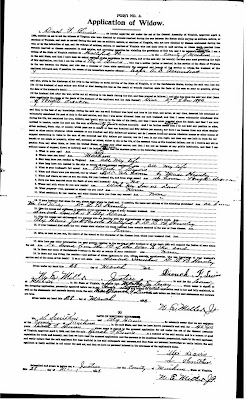 Twelve years after his death and two months before hers, on March 28, 1905, his widow and my 2nd great grandmother, Diana F. Marchant (1937-1905), filed a widow’s pension application, which was a benefit extended to Confederate widows by the United States government beginning in 1890. She said her husband served the Confederacy from "the 1st of the War to the end." She listed Leonard Smither and Alex Davis as comrades in arms with her husband.
Twelve years after his death and two months before hers, on March 28, 1905, his widow and my 2nd great grandmother, Diana F. Marchant (1937-1905), filed a widow’s pension application, which was a benefit extended to Confederate widows by the United States government beginning in 1890. She said her husband served the Confederacy from "the 1st of the War to the end." She listed Leonard Smither and Alex Davis as comrades in arms with her husband.
What made me think of the Surrender at Appomattox last week was Heather Cox Richardson’s April 8 “Letters from an American” newsletter in which she described the miserable conditions and, in the end, Grant’s actions, reflecting Lincoln’s “malice toward none; with charity for all” directive. Said Richardson in her newsletter, “Grant knew it was only a question of time before Lee had to surrender. The people in the Virginia countryside were starving and Lee’s army was melting away.” After the surrender papers were signed, Lee told Grant his men were starving and he asked the Union General for rations for the Confederate troops. Without missing a beat, Grant said yes, then asked how many men needed food. Lee answered, “about 25,000.” Not a problem. The Union had plenty.
I had assumed Grandfather Robert was living in the midst of this horrific experience, but hadn’t looked into his service beyond the pension application, or examined his life around the time of the Civil War, until reading Richardson’s newsletter. This past weekend I began to research the details to relate as an Ancestor Confession. As I do in this blog, I write because I confess a family trespass or hardship or something I had not given much thought to before, in the spirit of my George Floyd-inspired awakening to racial injustice. In this case, I wondered, why did Robert T. Lewis serve from "the 1st of the War to the end?" I knew he wasn’t a wealthy slaveowner, like some of the Joneses, Smiths, and Billupses I researched and wrote about in March.On the National Park Service (NPS) web pages concerning the Civil War, Armistead’s Company, Virginia Light Artillery is described as “formed in July, 1861, with men from Mathews County. It first served at Yorktown.” In 1864, three years later, they fought “for some time” near Petersburg. Finally, they “surrendered with the Army of Northern Virginia” on April 9, 1865.
When organized, the unit contained 72 men. A local researcher noted that a total of 174 men are listed in records of the Mathews Light Artillery. Robert T. Lewis’s name appears in her list, as well as in the National Park Services’ list of Armistead’s Company, which includes 207 men. The NPS website also includes lists of prisoners of war taken at the Appomattox Court House surrender, and released with documentation, called parole passes, which allowed them to “return to their homes not to be disturbed by the United States Authority so long as they observed their parole and the laws in force where they reside.” On April 9, 1865, the Mathews Light Artillery unit contained 70 men who were taken prisoner and paroled.
My 2nd great grandfather was not among them. Neither was his comrade in arms Alex Davis. Leonard Smithers, however, served to the bitter end and received a prisoner of war’s parole pass.
I can certainly understand why my ancestor deserted, or simply didn’t make it to the Surrender due to the hardships of the Appomattox Campaign. The last record in his service file is dated 28 February 1865, according to Patrick Schroeder, historian, Appomattox Court House National Park. In an email message to me he continued, “What happened to him between the end of February and April 9, 1865, looks to be a mystery that may not be solved. More than 10,000 men left Lee’s army during the Appomattox campaign, so he may be one of those. Or perhaps he was sick and in a hospital somewhere.”Other essays on the NPS website describe the pre-surrender-year events. Beginning in the summer of 1864, Lee’s Army became trapped in Petersburg, Virginia, between Federal forces moving up from the south and Grant’s command to the north. By fall, three of the four railroads into Petersburg were severed. In the winter of 1864-1865, Lee recognized the danger posed by the armies closing in on him from the south and north. He wrote to the Confederate Secretary of War on February 8, 1865 that, “You must not be surprised if calamity befalls us.”
I wondered about the life circumstances leading up to my great great grandfather’s finding himself in this situation. I can’t find Robert T. Lewis in the 1850 U.S. Federal Census. But he was married to 18-year-old Diana Marchant on 6 Jan 1855 by Muse Hunley in her parent’s home. Curiously, five years earlier, the 1850 census does show a Walter Lewis, age 22, living with the Marchants when Diana was 13. Could the name Walter have been an error? Robert would have been 22 in 1850. Robert and Diana’s first son, my great grandfather, Charles Leonard Lewis (1855-1940), was born in December, 11 months after the couple’s marriage. In 1860, the Census finds them living next door to Diana’s recently widowed father, John J. Marchant (1806-1873), now with three sons. Her brother, John Wesley Marchant (1835-1886), his wife, and their two daughters lived with the senior Marchant, whose real estate was valued at $4,000, or about $127,000 today. Neither of his children’s families owned real estate, so it appears Robert, whose 1860 occupation was given as “Farmer,” farmed with his father-in-law, also a farmer. John Wesley’s occupation is listed as “Seaman.”
John J. Marchant’s name does not appear in the 1860 Census schedule as a slaveowner (nor does son-in-law Robert’s or son John’s), but that may be another error. He appeared as an enslaver of two people in 1850 and in 1860 a John H. Marchant appears to live in the neighborhood. He enslaved 13 people. Ten of them are spread between the ages of four months and 13 years. The other four are women, one aged 17 and the others in their 30s. If you believe that the Civil War was fought to maintain slave labor, this group seems out of keeping. The group is a mix of mostly dependent children. Ah, yes, but enslaved people were money, if he couldn't sell them to a neighbor, he sold to them to an itinerant slave trader who took them to the Richmond slave market.
Of course, the pragmatic notion that individuals would lose their personal free labor force had less to do with Virginians signing on as soldiers than the idea that they were protecting their collective property and security. Their shared sense of honor as a society, which practiced enslavement, was offended by the election of a Republican president hostile to slavery. Four years of war hardened their resolve. Confederates wanted separation from the Union as a matter of honor, but over time they grew to hate Northerners and see slavery as exceptionally important to their "honorable" way of life. Studies have shown that Virginia enlistment was highest in counties, not where the number of slaveholders was highest but where the percent of the population enslaved was the highest. The more people held as slaves, the higher the enlistment figures. About 45 percent of Mathews' population was enslaved. This says to me that my ancestors couldn’t imagine a community with Blacks living freely and equally among them. They could not concede to their agency as human beings.I looked through the lists of soldiers on the NPS website for
evidence of other ancestors at Appomattox. I found nothing, for now. In my last
post, I described another 2nd great grandfather’s experience. While Robert was bogged down in the Petersburg trenches, Walter Gabriel Jones was in prison at Point
Lookout, Maryland. I mentioned in the blog post that he was
“exchanged” on 16 March 1865. In reading about parole passes for this post, I
learned that the process of releasing prisoners of war may have also been referred
to as a parole or an exchange. So, Walter, with his official paperwork,
and Robert, who “disappeared” between February 28 and April 9, probably made it
back to Mathews at about the same time.
Another 2nd great grandfather, Joseph Finch Foster, Sr. (1819-1896), a slaveholder with real estate valued at $6,000, or just over $190,000 today, and personal property valued at $10,000, or about $317,000 today, was 46 years old in 1865. He did not serve in the Confederate military. However, he passed southeast of Petersburg, where Robert was entrenched, when traveling to Eagle Rock, Wake County, North Carolina, to marry his second wife Annie “Nannie” Glen Debnam (1835-1900) on 21 December 1864. She was the oldest daughter of Thomas Richard Debnam (1806-1873) and Priscilla Macon (1812-1878). In 1860, the Debnams owned 53 enslaved people.
In case you are interested in complicated genealogy, Richard and Pricilla Macon Debnam are my 3rd great grandparents, and parents of Annie “Nannie” Glen Debnam, mentioned above, and her sister of Arabella Catherine Debnam (1837-1900), who is my 2nd great grandmother and mother of my great grandmother Belle Catherine Hodge, second wife of Henry H. Foster (1851-1930). Other sisters of Nannie and Arabella were Madelaine and Corea. They were the first wives of Joseph Sr.’s sons, Henry H. Foster (1851-1930) and Joseph Jr. in 1870 and 1887. So, the Foster father and two of his sons married three Debnam sisters . . . and a niece. Henry was my great grandfather, Madelaine was his first wife, and Belle, the niece, was his second. But wait! There's more! Joseph Finch Foster, Sr.’s first wife, Anne Macon Hudgins (1830-1859) is my 2rd great grandmother. She is the daughter of my 3th great grandparents, Lewis Hudgins (1797-1866) and Elizabeth Williams (1804-1850). The Macon middle name suggests her mother Elizabeth Williams relates to Pricilla Macon somehow. Seriously, cousin marriages.
While researching and writing my Ancestor Confessions, I am learning a lot more than I first imagined. And knowledge is cumulative. I have unearthed relationships and connections I hadn’t known about. I see the past less as a foreign country. Personal history comes to life. Before, I hadn’t been a bit interested in the Civil War. In fact, I avoided everything to do with studying the Civil War and was angry about how many people seemed to celebrate the Lost Cause. But as I learn more about it now, I have greater empathy for my ancestors and their world. It dawned on me that there is injustice I need to take responsibility for, to repair. Perhaps this is one unconscious reason why I had not wished to examine the Civil War earlier, because of my implicit guilt.










No comments:
Post a Comment